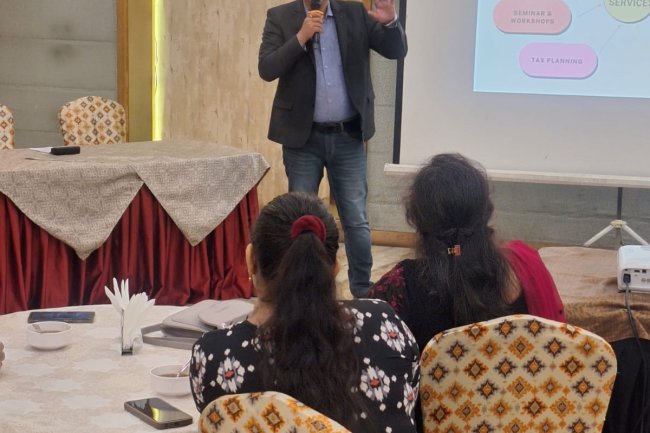Resilience at Work: Why Psychological Safety is the New Retention Currency Dr. Shilpa Shinde, Associate Professor

In today’s fast-evolving work environment, where artificial intelligence is automating tasks and hybrid models are redrawing the boundaries between personal and professional life, one critical truth is emergingemployees are no longer just leaving for better salaries; they’re walking away from workplaces where they don’t feel safe, heard, or respected. The traditional perks of corporate lifefree snacks, casual Fridays, or even flexible hoursare no longer enough to retain talent. What employees seek now is deeper: psychological safety. It is this sense of emotional and interpersonal security that is quickly becoming the new workplace currency for employee retention.
Across India’s diverse workplacesfrom high-tech offices in Bengaluru to manufacturing setups in Pune a silent wave of attrition is building. While burnout and external opportunities contribute to this trend, the root cause often lies in the emotional climate of the organization. Employees today, especially the younger generations, are prioritizing environments that allow them to be authentic, admit mistakes without fear, voice disagreements openly, and share creative ideas without facing ridicule. In this shifting landscape, resilience is no longer defined by how much stress one can tolerate, but by how supported one feels in facing challenges. Psychological safety provides the foundation on which true workplace resilience is built.
This requires a fundamental shift in mindsetfrom focusing solely on performance metrics to nurturing a culture of trust and belonging. Historically, workplace management has been dominated by productivity KPIs and quarterly targets. But as research, including Google’s Project Aristotle, has shown, the most effective teams aren’t the ones with the highest IQsthey’re the ones with the highest levels of psychological safety. When people feel safe, they collaborate better, take creative risks, and engage more deeply with their work. It’s a strategic asset, not a soft luxury.
Conversely, when psychological safety is absent, employees retreat into survival mode. They stay quiet in meetings, hide errors, filter ideas, and experience chronic stress. Over time, this leads to disengagement, absenteeism, and ultimately, resignation. For underrepresented groupslike women re-entering the workforce, Migrated employees, and those from marginalized communitiesthis lack of safety is even more pronounced. In many Indian workplaces, where mental health remains stigmatized and hierarchy dominates, their challenges are often invisible and unaddressed.
To reverse this trend, organizations must treat psychological safety as a leadership responsibility, not just an HR initiative. This begins with creating a culture where vulnerability is normalizedleaders admitting mistakes or uncertainty can signal that it’s okay to be imperfect. Constructive dissent must be welcomed and rewarded. Safe spacesboth formal and informalshould be created for honest conversations. Managers should be trained not only in technical skills but also in emotional intelligence, empathy, and active listening. Importantly, solutions must be tailored to fit local and cultural contexts. What works for a startup in Mumbai might not suit a family-run business in Kolhapur. Context-sensitive, inclusive approaches are key.
The impact of psychological safety extends far beyond the workplace. When employees feel valued and respected, they bring that positivity back to their homes and communities. In a country where job stress often affects family well-being and social relationships, fostering emotionally safe workplaces can ripple outward to improve societal health. Furthermore, industries that embrace psychological safety tend to retain women leaders, support differently abled individuals, and amplify the voices of those who’ve long been excluded. These are not just organizational gainsthey are social advancements.
The call to action is clear. Companies must look beyond pay and perks to create cultures of safety and connection. Policymakers and industry bodies should consider including psychological safety in workplace wellness regulations and diversity mandates. This is not just an HR concernit’s a public policy and social justice issue. For employees, the challenge is to reflect: Does your workplace feel emotionally safe? Do you have the freedom to speak up, fail, or ask for help? If not, it may be time to initiate change. And for leaders, the question is urgent: Have you created a space where your team feels humannot just functional?
As India continues to transform into a knowledge-driven, innovation-led economy, our biggest competitive edge will not be technology or capitalit will be people who feel safe enough to thrive. Because true resilience is not just about bouncing back after adversity. It’s about having the emotional security to leap forward with confidence.
In this light, psychological safety is not a “nice-to-have.” It is the backbone of sustainable leadership, long-term retention, and collective well-being. We must treat it as suchnot tomorrow, but today. Let this be the moment where we shift the conversation, provoke reflection, and take action to build workplaces that protect, empower, and uplift.
What's Your Reaction?




















